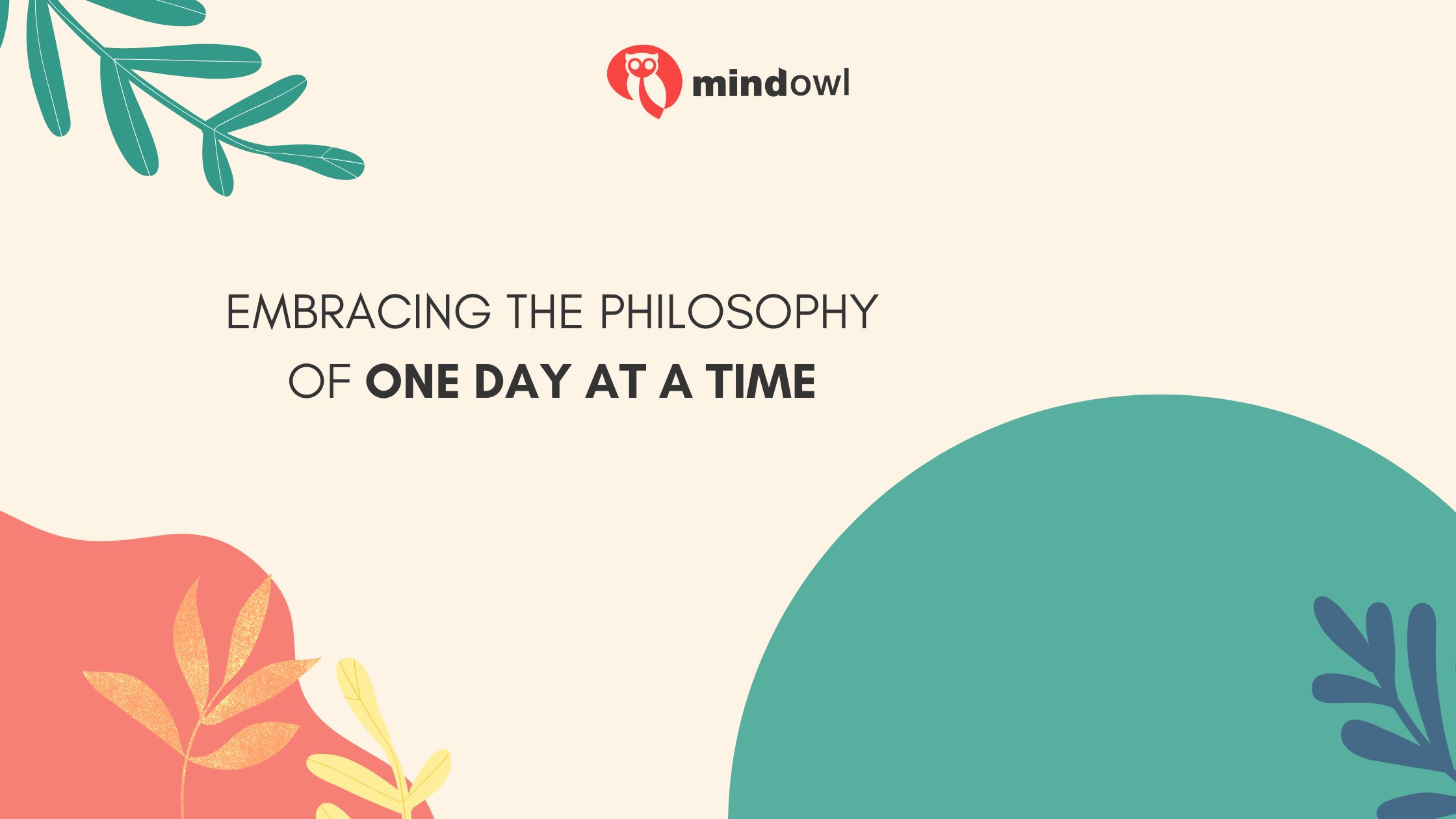
Life can often feel chaotic and overwhelming, leaving us gasping for breath. Did you know there is a way to navigate these turbulent moments by adopting the approach of living ‘one day at a time’? In this blog post, we’ll explore how focusing on the present moment can help reduce stress, increase resilience and lead to greater happiness.
Ready to journey towards peace? Let’s dive in!
Key Takeaways
- Taking life one day at a time can reduce anxiety about the future, allowing us to have a calmer and clearer mind.
- Appreciating the present moment helps us find joy in small things and improves our overall happiness and health.
- Breaking down larger goals into smaller tasks, focusing on progress rather than perfection, and celebrating achievements along the way can lead to success.
- Accepting change, developing coping mechanisms, seeking support when needed, and prioritizing self-care are important for building resilience and maintaining physical and mental well-being.
The Importance of Taking One Day at a Time
 Taking one day at a time eliminates anxiety about the future, helps us appreciate the present moment, and reduces stress and overwhelm.
Taking one day at a time eliminates anxiety about the future, helps us appreciate the present moment, and reduces stress and overwhelm.
Eliminates anxiety about the future
Living one day at a time can wipe out worry about what will happen next. Just like finding the right acne prone vegan skincare routine requires patience and consistency, taking life step by step puts a stop to fears and keeps your mind calm. You have less anxiety for the coming days as you focus on today only.
This way, it can help you sleep better at night. By not looking too far ahead, you give your brain a break from stress. Your thoughts become clearer and more peaceful.
Helps appreciate the present moment
Living one day at a time helps us enjoy each moment more. It lets us see the small things that make our life special. A cool breeze, a warm smile, or a good meal can bring joy when we take the time to notice them.
Being present in the moment lets us learn better and think clearer. It makes our memory strong. We hear what others say with care. We do not waste time thinking about past events or future worries.
Instead, we win the day by dealing with today’s tasks and joys only. This approach takes away worry and stress from our life. As such, living one day at a time can improve happiness and health for all of us.
Reduces stress and overwhelm
Living one day at a time reduces stress and worry. It helps you stay calm. A calm mind can think better and solve problems faster. Stress goes down when you focus on today, not on what might happen tomorrow or in the future.
Taking mental health days is also good for this. You get a break from all of life’s worries. This break lifts your mood and makes you stronger against tough times. It even helps you sleep better! So try to take things one day at a time – it’s an easy way to make things better.
Embracing Small Pleasures

Finding joy in everyday activities, such as enjoying a hot cup of tea or taking a leisurely walk in nature, can help cultivate gratitude and enhance mindfulness.
Finding joy in everyday activities
Finding joy in daily tasks can make life more fun.
- Start the day with a morning walk. It brings peace and joy.
- Listen to music while doing chores. Music can lift your mood.
- Spend time with loved ones everyday. Their company can bring a lot of joy.
- Try cooking new recipes for dinner. This opens up a chance to learn and have fun.
- Give some time to hobbies or passions daily.
- Buy fresh flowers once in a while, it will be worth it.
- Make time for self – care, like doing yoga or reading a book.
Cultivating gratitude
Gratitude is a big part of living life one day at a time. To cultivate gratitude, we focus on the good things in our lives. We pay attention to the small joys that we might usually miss.
Seeing and feeling these joys can make us happier.
Practicing gratitude also helps our mind be calm and clear. This makes it easier for us to deal with hard things in life. By taking one day at a time, you learn how to think straight, feel everything and win each day by making progress moving forward.
Cultivating gratitude is like winning tomorrow before it even arrives.
Practicing mindfulness
Mindfulness is about living in the now. It puts our mind on what we are doing right at this moment. This helps us to see and feel all that is around us with no judgement. Our brain can work better and has a clear memory when we practice mindfulness often, even just for a short time each day.
Daily life becomes less stressful and can bring more joy when we use mindfulness to slow down and be present in every moment.
Setting Realistic Goals
Breaking down larger goals into smaller, manageable tasks helps maintain focus and motivation. Celebrate your achievements along the way, no matter how small they may seem. Read on to discover how setting realistic goals can transform your approach to life and increase your chances of success.
Breaking larger goals into smaller, manageable tasks
Life can be less hard when you break big tasks into smaller ones. Here are some ways to do it:
- Set up mini-milestones: With this, your main goal becomes a set of short steps. It makes the journey seem less long.
- Use weekly goals: Divide your main task into tasks that fit in a week. This helps you move forward every week.
- Put it on paper: Writing your tasks down can make them seem less big and hard to do.
- Prioritize: Some tasks are more important than others. Do those first.
- Think about each day, or week, or month: It’s easier to focus on small pieces of time.
- Step by step gets you there: Every small task you finish brings you closer to finishing the big one.
- Celebrate your wins: Small steps are still steps forward! It’s good to feel happy about what you have done.
Focusing on progress rather than perfection
Focusing on progress rather than perfection means putting more importance on making forward strides rather than trying to achieve flawless results. It’s about embracing the idea that continuous improvement is key, rather than striving for an unattainable state of flawlessness.
When we focus on progress, we allow ourselves the freedom to learn from our mistakes and grow along the way. This mindset encourages us to take action and keep moving forward, even if things aren’t perfect.
By setting realistic goals and celebrating each step of progress, we can experience a sense of accomplishment and satisfaction. It also helps us stay motivated and avoid getting overwhelmed by the pursuit of perfection.
Celebrating achievements along the way
Celebrating achievements along the way is an important part of taking one day at a time. By recognizing and acknowledging our progress, we can boost our motivation and sense of accomplishment.
Whether it’s completing a small task or reaching a milestone, celebrating these achievements helps us stay motivated on our journey towards larger goals. It also allows us to appreciate how far we’ve come and reminds us that every step forward is meaningful.
So take the time to celebrate your victories, no matter how big or small they may be.
Building Resilience
Accepting and adapting to change is essential in building resilience.
Accepting and adapting to change
Change is a natural part of life, and accepting and adapting to it is crucial for our overall well-being. When faced with unexpected or challenging situations, being able to embrace change helps us navigate through them with resilience.
It allows us to let go of what we cannot control and focus on finding solutions instead. Resilience enables us to adjust our mindset and perspective, helping us see change as an opportunity for growth rather than a source of fear or resistance.
By building resilience, we can better cope with the uncertainties that come along in life and bounce back from adversity stronger than before.
Developing coping mechanisms
Developing coping mechanisms is important for managing stress and staying resilient. Here are some strategies to help you cope:
- Seek support from friends, family, or a therapist.
- Practice deep breathing or mindfulness techniques to reduce anxiety.
- Engage in physical activity to release tension and boost your mood.
- Find healthy ways to express your emotions, such as through journaling or creative outlets.
- Take breaks when needed and prioritize self – care activities like getting enough sleep and eating well.
- Challenge negative thoughts and focus on positive aspects of your life.
- Set realistic expectations for yourself and avoid perfectionism.
- Develop a routine or schedule to provide structure and stability.
- Practice relaxation techniques like meditation or listening to calming music.
- Identify triggers or stressors in your life and find ways to minimize their impact.
Seeking support when needed
Seeking support when needed is crucial for building resilience and navigating through tough times. It’s important to reach out to loved ones, friends, or professionals who can provide guidance and assistance.
By seeking support, we can gain different perspectives, receive encouragement, and find comfort during challenging moments. Whether it’s talking about our feelings, seeking advice, or asking for help with practical tasks, reaching out to others helps us build a strong support system that can uplift us in both good and bad times.
Remember that asking for support is not a sign of weakness but rather a courageous step towards growth and resilience.
Prioritizing Self-Care
Taking care of your physical and mental well-being should always be a top priority, setting boundaries and saying no when necessary is crucial.
Taking care of physical and mental well-being
To maintain your overall health and happiness, it’s important to prioritize taking care of your physical and mental well-being. Here are some ways you can do that:
- Engage in regular exercise to keep your body strong and healthy.
- Eat a balanced diet that includes nutritious foods like fruits, vegetables, lean proteins, and whole grains.
- Get enough sleep each night to allow your body to rest and recover.
- Practice stress management techniques such as deep breathing exercises or meditation.
- Take time for yourself to relax and unwind, whether it’s through reading a book, taking a bath, or listening to music.
- Seek support from others when you need it, whether it’s from friends, family, or professionals.
Setting boundaries and saying no when necessary
Setting boundaries and saying no when necessary is a crucial aspect of self-care. It means knowing your limits and prioritizing your own well-being. By setting boundaries, you are protecting yourself physically and emotionally from situations that may be harmful or overwhelming.
Saying “no” to requests that conflict with your personal priorities allows you to put yourself first and avoid unnecessary stress or burnout. While it can be challenging, especially with loved ones, setting boundaries is an important step in maintaining overall well-being.
Remember, saying “no” is not selfish; it is an act of self-preservation and taking care of yourself.
Engaging in activities that bring joy and relaxation
Taking time to engage in activities that bring joy and relaxation is an essential part of taking life one day at a time. Research has shown that exercise, yoga, and mindfulness practices have positive effects on both our mental and physical well-being.
By prioritizing self-care, we can reduce stress levels and promote overall happiness. Pursuing hobbies or passions that bring us fulfillment can also contribute to a sense of purpose and contentment.
Laughter is another powerful tool for relaxation; it can reduce pain, relax muscles, and alleviate anxiety. So whether it’s going for a walk in nature, playing music, practicing yoga, or simply spending time with loved ones – finding activities that bring us joy allows us to fully embrace the present moment and live each day to its fullest potential.
Conclusion
In conclusion, taking life one day at a time is an important mindset that can help reduce stress and anxiety. By embracing small pleasures, setting realistic goals, building resilience, and prioritizing self-care, we can focus on the present moment and find joy in everyday activities.
Remember to take each day as it comes and appreciate the journey rather than worrying about the destination.
FAQs
Q: What does “Taking It One Day At A Time” mean?
A: “Taking It One Day At A Time” is a philosophy or approach to life where you focus on the present moment and try not to worry about the future or dwell on the past. It means taking things one step at a time and dealing with each day as it comes.
Q: How can “Taking It One Day At A Time” benefit me?
A: Adopting the mindset of “Taking It One Day At A Time” can help reduce stress, anxiety, and overwhelm. It allows you to focus on what you can control in the present moment, rather than getting caught up in worrying about the future.
Q: What are some popular day at a time quotes?
A: Some popular quotes related to the philosophy of “Taking It One Day At A Time” include:
– “Live one day at a time, emphasizing ethics rather than rules.” – Wayne Dyer
– “Just for today, I will try to live through this day only, and not tackle my whole life problem at once.” – Alcoholics Anonymous
– “I can’t change the direction of the wind, but I can adjust my sails to always reach my destination.” – Jimmy Dean
Q: How can motivational one day at a time quotes help me?
A: Motivational one day at a time quotes can provide inspiration and remind you to stay focused on the present moment. They can help you maintain a positive mindset and give you the encouragement you need to keep moving forward.
Q: What is the significance of “live one day at a time”?
A: “Live one day at a time” is a reminder to fully embrace and live in the present moment. It encourages you to let go of regrets from the past and worries about the future, and instead, focus on making the most of each day.
Q: How can I apply the philosophy of “take it one day at a time” in my life?
A: To apply the philosophy of “take it one day at a time” in your life, try breaking down larger tasks or goals into smaller, manageable steps. Focus on what you can accomplish today and trust that by taking consistent action, progress will be made over time.
Q: How can I overcome the fear and try to take it one day at a time?
A: Overcoming fear and embracing the philosophy of “taking it one day at a time” often requires a shift in mindset. Start by acknowledging and accepting that you can’t control everything. Practice letting go of the need to have all the answers and instead, focus on the present moment and what you can do today.
Q: How can I develop a new philosophy of living one day at a time?
A: Developing a new philosophy of “living one day at a time” starts with a conscious decision to prioritize the present moment. It may involve letting go of old thought patterns and replacing them with more positive and present-focused ones. Practice mindfulness, gratitude, and self-care to support this new way of living.
Q: What does “day by day” mean in the context of “taking it one day at a time”?
A: “Day by day” in the context of “taking it one day at a time” means focusing on the present day and not getting caught up in worries or plans for the future. It involves understanding that you can only control what happens in the present moment and making the most of each individual day.
Q: What are some inspirational quotes to help you focus on taking it one day at a time?
A: Here are some inspirational quotes to help you focus on taking it one day at a time:
– “One day at a time… this is enough. Do not look back and grieve over the past, for it is gone; and do not be troubled about the future, for it has yet to come. Live in the present, and make it so beautiful that it will be worth remembering.” – Ida Scott Taylor
– “Worrying does not take away tomorrow’s troubles, it takes away today’s peace.” – Unknown
Q: How can I incorporate the philosophy of taking it one day at a time in my everyday life?
A: To incorporate the philosophy of taking it one day at a time in your everyday life, try practicing mindfulness and staying present in each moment. Remind yourself to focus on what you can control today and let go of worries about the future. Take breaks and prioritize self-care to stay balanced and centered.
MindOwl Founder – My own struggles in life have led me to this path of understanding the human condition. I graduated with a bachelor’s degree in philosophy before completing a master’s degree in psychology at Regent’s University London. I then completed a postgraduate diploma in philosophical counselling before being trained in ACT (Acceptance and commitment therapy).
I’ve spent the last eight years studying the encounter of meditative practices with modern psychology.

